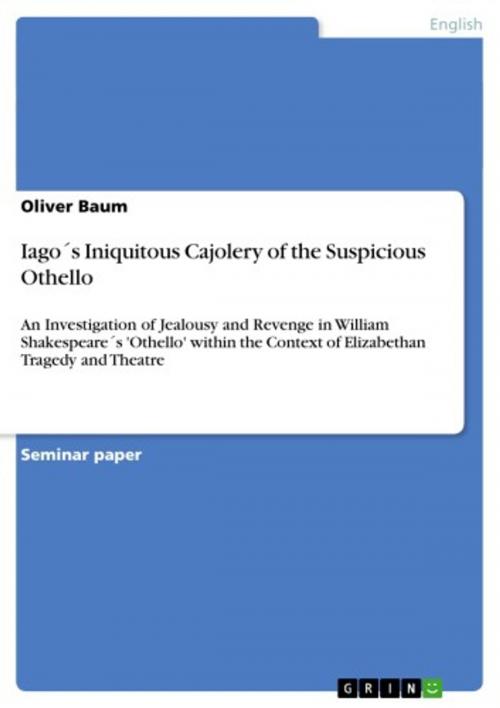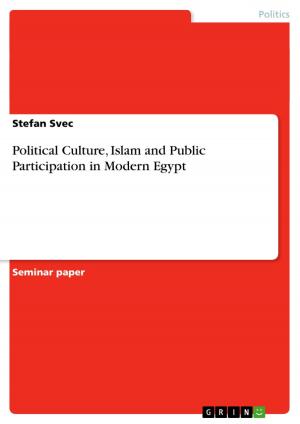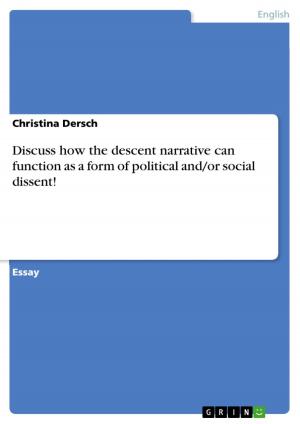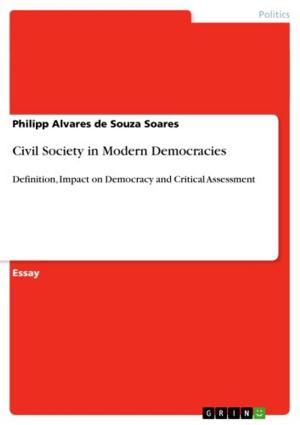Iago´s Iniquitous Cajolery of the Suspicious Othello
An Investigation of Jealousy and Revenge in William Shakespeare´s 'Othello' within the Context of Elizabethan Tragedy and Theatre
Fiction & Literature, Literary Theory & Criticism, British| Author: | Oliver Baum | ISBN: | 9783640275328 |
| Publisher: | GRIN Publishing | Publication: | February 25, 2009 |
| Imprint: | GRIN Publishing | Language: | English |
| Author: | Oliver Baum |
| ISBN: | 9783640275328 |
| Publisher: | GRIN Publishing |
| Publication: | February 25, 2009 |
| Imprint: | GRIN Publishing |
| Language: | English |
Seminar paper from the year 2007 in the subject English Language and Literature Studies - Literature, grade: 2,0, University of Marburg (Institut für Anglistik und Amerikanistik, FB 10), course: Preparatory Seminar to the Shakespeare Excursion to London, 38 entries in the bibliography, language: English, abstract: This paper expatiates on the topic of jealousy and revenge as it emanates from the play. Lily B. Campbell labels Othello 'A Tragedy of Jealousy'.9 Certainly, for most recipients, Othello is about jealousy and, thus, 'shocking, even horrible'.10 Harold Bloom announces that Othello's 'name in effect becomes jealousy' (Fernie 19). Critics characterise Othello as not smoothly jealous, inherently jealous, and too eagerly beguiled 1 For so that he becomes fervently resentful (cf. Davison 13). While Davison regards jealousy as a calamitous vigour in Othello, Mason grants the mastery of maleficence.11 I will verify my thesis that the envious Iago causes Othello's jealousy which culminates in frantic reprisal. Hence, I retain that Iago's malice and fake honesty annihilate Othello's bond. To fathom the tragedy of Othello, it is indispensable to specify the cognitive theory of jealousy and envy which eventuates from psychology's interest in anthropoid liaisons, and is primordial and reiterative in literature. Tales of cruel jealousy appealed to Elizabethans on account of the notion that women are impious and that the husband's reputation is contingent on his wife's celibacy. Shakespeare's interest in jealousy stems from Elizabeth Cary's (c. 1585-1639) closet drama Mariam (1603/1613). Traditionally, jealousy supervenes in comedy and is linked to sexual possessiveness.12 The theory of humours13 defines jealousy as 'a species of envy, which is in turn a species of hatred' (Honigmann 33). Although jealousy has come to be used frequently for envy, both terms should be separated. While jealousy connotes what you own and do not fancy to be deprived of, envy is what you would like to retain but do not have. Spinoza specifies jealousy as 'the hatred towards an object loved [...] with the envy of another'.14 In 2.1., I will discuss Othello as domestic and revenge tragedy. For Stanley Wells explains that Shakespeare fosters 'the emotional response of his audiences',15 in 2.2., I will convey Othello's origin within Elizabethan theatre. In 3.1. and 3.2., I will scrutinize Iago's vice tradition and motivation. This is vital for the temptation scene which I will analyse, in 3.3. For 'the study and the stage' are 'often separate' (Matteo 1), I will include the stage. In 4., I will reflect my results.
Oliver Baum, 1979 in Hamburg geboren, studierte Anglistik Literaturwissenschaft, Amerikanistik und Europäische Ethnologie und absolvierte eine Ausbildung zum staatlich geprüften Fremdsprachenkorrespondenten/ Europasekretär. Er arbeitete in einem Verlag, in Redaktionen, in einer Musikagentur sowie als ehrenamtlicher Übersetzer und jobbte mehrere Jahre in einem Supermarkt an der Kasse. Neben wissenschaftlichen Essays und diversen Texten schreibt er vor allem Lyrik und auch Prosa. "Krähen im Feuerwind" ist sein erster Gedichtband. Oliver Baum lebt derzeit in Berlin und arbeitet an weiteren Lyrik- und Prosaprojekten.
Seminar paper from the year 2007 in the subject English Language and Literature Studies - Literature, grade: 2,0, University of Marburg (Institut für Anglistik und Amerikanistik, FB 10), course: Preparatory Seminar to the Shakespeare Excursion to London, 38 entries in the bibliography, language: English, abstract: This paper expatiates on the topic of jealousy and revenge as it emanates from the play. Lily B. Campbell labels Othello 'A Tragedy of Jealousy'.9 Certainly, for most recipients, Othello is about jealousy and, thus, 'shocking, even horrible'.10 Harold Bloom announces that Othello's 'name in effect becomes jealousy' (Fernie 19). Critics characterise Othello as not smoothly jealous, inherently jealous, and too eagerly beguiled 1 For so that he becomes fervently resentful (cf. Davison 13). While Davison regards jealousy as a calamitous vigour in Othello, Mason grants the mastery of maleficence.11 I will verify my thesis that the envious Iago causes Othello's jealousy which culminates in frantic reprisal. Hence, I retain that Iago's malice and fake honesty annihilate Othello's bond. To fathom the tragedy of Othello, it is indispensable to specify the cognitive theory of jealousy and envy which eventuates from psychology's interest in anthropoid liaisons, and is primordial and reiterative in literature. Tales of cruel jealousy appealed to Elizabethans on account of the notion that women are impious and that the husband's reputation is contingent on his wife's celibacy. Shakespeare's interest in jealousy stems from Elizabeth Cary's (c. 1585-1639) closet drama Mariam (1603/1613). Traditionally, jealousy supervenes in comedy and is linked to sexual possessiveness.12 The theory of humours13 defines jealousy as 'a species of envy, which is in turn a species of hatred' (Honigmann 33). Although jealousy has come to be used frequently for envy, both terms should be separated. While jealousy connotes what you own and do not fancy to be deprived of, envy is what you would like to retain but do not have. Spinoza specifies jealousy as 'the hatred towards an object loved [...] with the envy of another'.14 In 2.1., I will discuss Othello as domestic and revenge tragedy. For Stanley Wells explains that Shakespeare fosters 'the emotional response of his audiences',15 in 2.2., I will convey Othello's origin within Elizabethan theatre. In 3.1. and 3.2., I will scrutinize Iago's vice tradition and motivation. This is vital for the temptation scene which I will analyse, in 3.3. For 'the study and the stage' are 'often separate' (Matteo 1), I will include the stage. In 4., I will reflect my results.
Oliver Baum, 1979 in Hamburg geboren, studierte Anglistik Literaturwissenschaft, Amerikanistik und Europäische Ethnologie und absolvierte eine Ausbildung zum staatlich geprüften Fremdsprachenkorrespondenten/ Europasekretär. Er arbeitete in einem Verlag, in Redaktionen, in einer Musikagentur sowie als ehrenamtlicher Übersetzer und jobbte mehrere Jahre in einem Supermarkt an der Kasse. Neben wissenschaftlichen Essays und diversen Texten schreibt er vor allem Lyrik und auch Prosa. "Krähen im Feuerwind" ist sein erster Gedichtband. Oliver Baum lebt derzeit in Berlin und arbeitet an weiteren Lyrik- und Prosaprojekten.















